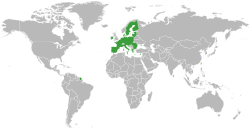Taiwan–European Union relations
Taiwan–European Union relations refers to the informal international relations between the Republic of China (ROC), commonly known as Taiwan, and the European Union (EU). These relations are marked by the current adherence of all EU member states to the One-China policy,[1] conveyed by the recognition of the People's Republic of China (PRC) as the sole sovereign state under the name 'China'. The EU manages the European Economic and Trade Office in Taipei, while the ROC operates the Taipei Representative Office in the EU and Belgium in Brussels.
 | |
EU |
Taiwan |
|---|---|
The EU’s relations with Taiwan are informed by their shared democratic tradition and close high tech economic ties.[2] While historically economic relations have been significant they were often overshadowed by the EU’s relations with larger trading partners like Japan and the US, more recently relations with Taiwan have been overshadowed by booming economic opportunities in China.[3]
Back in 2001, the EU Commission referred Taiwan as a "separate customs territory, but not as a sovereign state", highlighting the role of Taiwan as autonomous economic entity for the purposes of the establishment of relations with the European Union.[4]
In 2009 there were more than 30,000 Taiwanese students studying in Europe. Also in 2009 the EU opened a European Union Centre in Taiwan.[5]
Filip Grzegorzewski took over as the chief of the European Economic and Trade Office (EETO) in Taiwan in September 2019.[6]
In April 2020 European Commission President Ursula von der Leyen tweeted her appreciation for Taiwan's donation of 5.6 million masks to EU countries to help fight the COVID-19 outbreak.[7]
Trade
In 2018 bilateral trade between Taiwan and the EU stood at 51.9 billion euros (US$58.1 billion).[8]
References
- Lim & Winkler 2012, p. 170.
- Dekker, Brigitte. "WHY THE EU SHOULD PAY MORE ATTENTION TO TAIWAN". www.clingendael.org. Clingendael. Retrieved 14 April 2020.
- Ash, Robert (March 2002). "Economic Relations between Taiwan and Europe". The China Quarterly. 169 (169): 154–180. doi:10.1017/S0009443902000104. JSTOR 4618710.
- Lim, Paul; Winkler, Sigrid (2012). "The European Union's Relations with the Republic of China (Taiwan)". In Damm, Jens; Lim, Paul (eds.). European Perspectives on Taiwan. Springer VS. p. 179. doi:10.1007/978-3-531-94303-9. ISBN 978-3-531-18580-4.CS1 maint: ref=harv (link)
- Peter Cramer, N. "Why Taiwan-EU relations are improving". www.europeanbusinessreview.eu. European Business Review. Retrieved 14 April 2020.
- Hou, Elaine; Hsin-Yin, Lee. "EU envoy looking to attract more Taiwan investment to Europe". focustaiwan.tw. Focus Taiwan. Retrieved 14 April 2020.
- Hutt, David. "Taiwan sees doors open in Europe as virus response earns respect". asia.nikkei.com. Nikkei Asia Review. Retrieved 14 April 2020.
- "Taiwan-EU relations report spotlights flourishing economic ties". taiwantoday.tw. Taiwan Today. 17 July 2019. Retrieved 14 April 2020.

